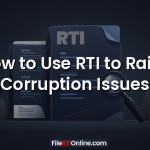When individuals file RTI (Right to Information) applications seeking data from large public sector companies, they often face a common issue: the information is scattered, voluminous, or commercially sensitive. A recent case involving United India Insurance Company Limited (UIIC) and a request for details of vehicles owned and insured explains how such situations are handled Central Information Commission (CIC).
This article breaks down the case, explains the decision, and clarifies what you can realistically obtain under the RTI Act in similar matters.
Background of the Case
The applicant had filed an RTI request with United India Insurance Company asking for comprehensive details of all LIC-owned vehicles insured , including:
- Policy numbers
- User name & address
- Insured Declared Value (IDV)
- Make & model
- Registration numbers
The Public Information Officer (PIO) rejected the request citing two grounds:
1. Information was too voluminous
The PIO explained that collecting and compiling information from thousands of branches would disproportionately divert resources, which is exempt under Section 7(9) of RTI.
2. Information was commercially sensitive
The PIO invoked Section 8(1)(d) of the RTI Act:
No obligation to provide information relating to commercial confidence, trade secrets or intellectual property if it harms the competitive position of a third party.
They argued that the insurance details of a corporate client (LIC) were part of UIIC’s business interests.
Arguments During the Hearing Before CIC
Applicant’s Argument
- LIC is a corporate client of UIIC.
- LIC has a corporate client code, through which all insured vehicle details can be accessed easily.
- Since Mumbai office already shared the corporate code, UIIC should be able to provide complete information.
Respondent’s (UIIC) Argument
- Information is scattered across 1400 offices countrywide.
- RTI Act does not require compiling information in the format asked applicant.
- The corporate code shared office is possibly regional, not universal.
- If the code is not universal, information cannot be extracted centrally.
Decision of the CIC
The CIC issued the following direction:
1. Verify Corporate Client Code
The PIO must check:
- Whether LIC has one universal corporate client code applicable nationwide,
OR - The code provided earlier was only for a specific regional office.
If a universal code exists, information linked to that code must be provided.
2. No obligation to compile massive data
The CIC agreed with UIIC:
- Under RTI, public authorities are not required to collect, compile, or create data in the format requested.
3. Commercial exemption applies
If data is scattered and connected to corporate business operations, some of it may fall under Section 8(1)(d).
Key Takeaways for RTI Applicants
1. Ask for Specific, Identifiable Records
Public authorities will not generate or compile data for you.
2. Corporate or third-party information may be exempt
Especially if it involves business dealings, trade information, or customer data.
3. Always check if a “code” or “reference number” exists
For large requests, having a:
- Client ID
- Account code
- Project number
- File number
… increases your chances of receiving information.
4. CIC may partly allow and partly restrict
They often balance:
- Applicant’s right to information
- Public authority’s resource limitations
- Third-party commercial confidentiality
Conclusion
This case is a good example of how RTI can be used to seek corporate-level insurance data, but also illustrates the limitations when information is:
- Voluminous
- Scattered across departments
- Commercially sensitive
The CIC’s approach was balanced: verify if the data can be accessed through an existing universal code, but avoid forcing the public authority to create or compile new information.


